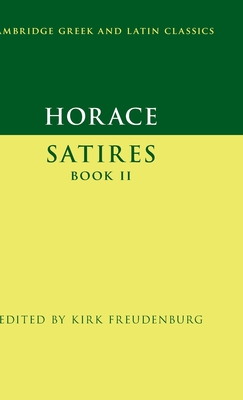

Horace: Satires Book II
4(1 readers)
The satires explored in this volume are some of the trickiest poems of ancient Rome's trickiest poet. Horace was an ironist, sneaky smart, and prone to hiding things under the surface. His Latin is dense and difficult. The challenges posed by these satires are especially acute because their voices, messages, and stylistic habits are many, and their themes range from the poet's anxieties about the limits of satiric free speech in the first poem to the ridiculous excesses of an outrageously overdone dinner party in the last. For students working at intermediate and advanced levels of Latin, this book makes the satires of Horace's second book of Sermones readable by explaining difficult issues of grammar, syntax, word-choice, genre, period, and style. For scholars who already know these poems well, it offers fresh insights into what satire is, and how these poems communicate as uniquely 'Horatian' expressions of the genre.
Publisher
Cambridge University Press
Publication Date
4/1/2021
ISBN
9780521444941
Pages
364
Categories
About the Author

Horatius
Odes
and
Satires
Roman lyric poet Quintus Horatius Flaccus exerted a major influence on English poetry.
(December 8, 65 BC – November 27, 8 BC)
Horace, the son of a freed slave, who owned a small farm, later moved to Rome to work as a coactor, a middleman between buyers and sellers at auctions, receiving 1% of the purchase price for his services. The father ably spent considerable money on education of his son, accompanied him first to Rome for his primary education, and then sent him to Athens to study Greek and philosophy.
After the assassination of Julius Caesar, Horace joined the army, serving under the generalship of Brutus. He fought as a staff officer (tribunus militum) in the battle of Philippi. Alluding to famous literary models, he later claimed to throw away his shield and to flee for his salvation. When people declared an amnesty for those who fought against the victorious Octavian Augustus, Horace returned to Italy, only to find his estate confiscated and his father likely then dead. Horace claims that circumstances reduced him to poverty.
Nevertheless, he meaningfully gained a profitable lifetime appointment as a scriba quaestorius, an official of the Treasury; this appointment allowed him to practice his poetic art.
Horace was a member of a literary circle that included Virgil and Lucius Varius Rufus, who introduced him to Maecenas, friend and confidant of Augustus. Maecenas became his patron and close friend and presented Horace with an estate near Tibur in the Sabine Hills (contemporary Tivoli). A few months after the death of Maecenas, Horace died in Rome. Upon his death bed, Horace with no heirs relinquished his farm to Augustus, his friend and the emperor, for imperial needs, and it stands today as a spot of pilgrimage for his admirers.
(December 8, 65 BC – November 27, 8 BC)
Horace, the son of a freed slave, who owned a small farm, later moved to Rome to work as a coactor, a middleman between buyers and sellers at auctions, receiving 1% of the purchase price for his services. The father ably spent considerable money on education of his son, accompanied him first to Rome for his primary education, and then sent him to Athens to study Greek and philosophy.
After the assassination of Julius Caesar, Horace joined the army, serving under the generalship of Brutus. He fought as a staff officer (tribunus militum) in the battle of Philippi. Alluding to famous literary models, he later claimed to throw away his shield and to flee for his salvation. When people declared an amnesty for those who fought against the victorious Octavian Augustus, Horace returned to Italy, only to find his estate confiscated and his father likely then dead. Horace claims that circumstances reduced him to poverty.
Nevertheless, he meaningfully gained a profitable lifetime appointment as a scriba quaestorius, an official of the Treasury; this appointment allowed him to practice his poetic art.
Horace was a member of a literary circle that included Virgil and Lucius Varius Rufus, who introduced him to Maecenas, friend and confidant of Augustus. Maecenas became his patron and close friend and presented Horace with an estate near Tibur in the Sabine Hills (contemporary Tivoli). A few months after the death of Maecenas, Horace died in Rome. Upon his death bed, Horace with no heirs relinquished his farm to Augustus, his friend and the emperor, for imperial needs, and it stands today as a spot of pilgrimage for his admirers.
Questions & Answers
Reader Reviews
Loading comments...